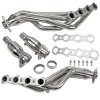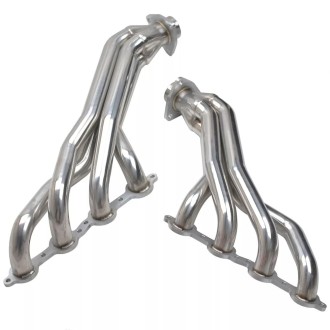- What is an Exhaust Manifold?
- What is the difference between an exhaust manifold and a header?
- What Does Headers Do for My Car?
- Should I choose an exhaust manifold or a header?
- Which Should I Use?
- How Much Does a Headers Exhaust Cost?
What is an Exhaust Manifold?
The mass production of automobiles, exhaust manifolds are commonly utilized instead of headers. These manifolds function by gathering exhaust gases emanating from the ports located within the cylinder heads of the engine, subsequently directing these gases towards the remaining components of the exhaust system.
Constructed predominantly from durable cast iron material, exhaust manifolds are recognized for their stout composition. They are designed with succinct inlets of varying lengths that converge into a singular collector. Vehicles powered by engines configured in a 'V' or flat layout are equipped with two distinct exhaust manifolds, each serving a bank of cylinders. Conversely, inline or straight engines typically have a single manifold responsible for managing exhaust gases.
What is the Difference Between an Exhaust Manifold and a Header?
- The exhaust manifolds are commonly utilized in standard production automobiles, while high-performance cars generally feature headers.
- The usual material used for constructing exhaust manifolds is thick cast-iron, while headers are commonly crafted from thin-walled stainless steel tubing.
- The exhaust manifolds are characterized by having brief inlets that might differ in lengths, whereas headers consist of extended primary tubes that are uniformly long.
- In most cases, exhaust manifolds are equipped with heat shields, whereas headers typically do not include heat shields .
- Headers result in reduced backpressure compared to exhaust manifolds.
What Does Headers Do for My Car?
The modification known as a "header" is an aftermarket upgrade for an exhaust manifold, which involves the use of longer and lighter pipes carefully tuned to enhance performance. Headers are designed to optimize the intensity and timing of exhaust pulses, aiming to improve engine performance. Unlike a traditional exhaust manifold, which typically consolidates three to four pipes into one, a header may feature four pipes merging into two, and then these two pipes merging into one. This configuration may also include additional bends and turns to better accommodate the engine bay with minimal modifications.
Moreover, the internal structure of a header is characterized by smoother surfaces and more gradual bends, enabling faster and smoother flow of exhaust gases out of the engine with reduced turbulence. This design facilitates quicker revving and improved overall engine responsiveness.
Should I Choose An Exhaust Manifold Or A Header?
The choice between an exhaust manifold and headers depends on your specific goals and vehicle. Here are some considerations to help you decide:
Stock vs. Performance:If your main concern is preserving your vehicle's original performance and dependability, the original exhaust manifold should be adequate. Headers are usually selected by individuals aiming to optimize performance improvements.
Performance Gains:Headers are known for providing greater performance improvements compared to stock exhaust manifolds, especially in high-performance applications. If you want more power and torque, headers are often the better choice.
Cost: Headers typically come at a higher cost compared to exhaust manifolds. It is advisable to take into account your financial considerations while deliberating on this choice.
Sound:If you enjoy a more aggressive exhaust note, headers can provide the sound you're looking for.
Which Should I Use?
In the realm of performance improvement, many enthusiasts find that simply swapping out their exhaust manifold for a header may not yield significant enhancements in performance unless corresponding modifications to the entire exhaust system, as well as the engine's intake, fueling, and ECU mapping, have also been made. To maximize the benefits of a header installation, it is essential to concurrently overhaul the vehicle's exhaust system to include freer-flowing pipes and mufflers. Installing a header without addressing the restrictions in the existing exhaust system and stock muffler may not result in substantial benefits, although the impact can vary depending on the specific characteristics of the car in question.
How Much Does a Headers Exhaust Cost?
The price of a headers exhaust system can fluctuate significantly depending on various factors, including the specific make and model of your car, the material utilized in the headers, and whether you are purchasing a complete exhaust system or solely the headers.
Typically, headers for a standard vehicle can be priced anywhere from $200 to over $1,500. If you decide to invest in a full headers exhaust system, which may encompass additional components like a high-flow catalytic converter and performance mufflers, you can expect the cost to escalate accordingly.
It is crucial to conduct thorough research and select headers that not only align with your vehicle's specifications but also cater to your performance objectives, all while keeping your budget constraints in mind.




Validate your login